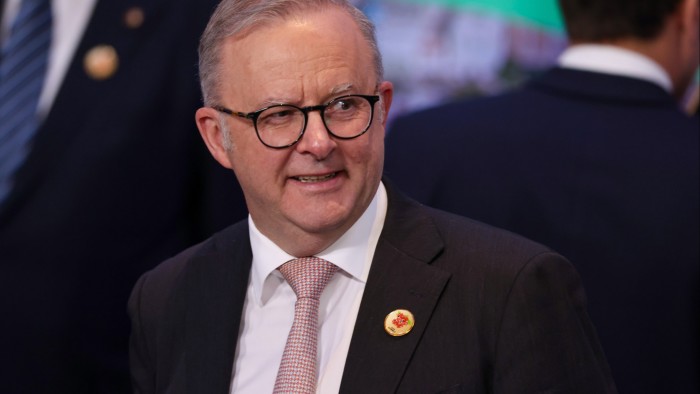Unlock the Editor’s Digest for free
Roula Khalaf, Editor of the FT, selects her favourite stories in this weekly newsletter.
Australia has introduced a bill to ban access to social media for under-16s and threatened penalties of up to A$50mn ($32.5mn) for “systemic” breaches by platforms such as Elon Musk’s X, Meta’s Instagram, TikTok and Snapchat.
Australia is the first country to suggest legislation that puts the onus on social media platforms, not parents, to stop children accessing their services. The bill, first announced in September, is expected to be passed into law by the end of the year.
“We know social media is doing social harm,” said Australian Prime Minister Anthony Albanese. “We want Australian children to have a childhood and we want parents to know the government is in their corner. This is a landmark reform.”
Technology companies will have to show they have taken “reasonable steps” to prevent people under 16 from registering for accounts. This should help alleviate the effects of persistent alerts and notifications that can have a negative impact on a child’s sleep, stress levels and attention span, the bill said.
Fines would be levied on platforms in cases of a “systemic failure to take action”.
The Australian government is also conducting a trial of age verification technologies, including biometrics, to determine how best to enforce the social media ban and to prevent access to online pornography for people under 18.
The bill acknowledges it is impossible to completely block children from accessing social media platforms. “We know some kids will find workarounds but we’re sending a message to social media companies to clean up their act,” Albanese said.
Australia’s legislation argues that age restrictions are the best approach to limit social media use, citing similar approaches used for the sale of alcohol and cigarettes.
The proposed legislation excludes online gaming and messaging services and YouTube, the video platform owned by Google, which is widely used in schools and by parents.
The Wiggles, a musical group popular with children for more than three decades, had urged the government not to treat YouTube as a social media platform, given it acts as a de facto streaming service and has already implemented safeguards for children.
While the government has highlighted the negative impact of social media on the mental health of children and teenagers, some academics and technology companies have argued that there could also be negative social effects from the social media ban on children.
Catherine Page Jeffery, a media and communications lecturer at the University of Sydney, said age limits were “not the right response” given many marginalised people rely on online communities for support and solidarity. She said children could flock to unregulated online services if popular services such as Snapchat and TikTok cannot be accessed.
Jeffery argued that it was wrong to compare social media to alcohol and cigarettes, as there is “no compelling body of evidence” that it was equally harmful and said the government should have consulted more with young social media users.
The Digital Industry Group, a trade body which represents technology companies, expressed concern that the legislation was being “rushed through parliament without scrutiny or consultation”.
Sunita Bose, the group’s managing director, said: “A blunt ban doesn’t encourage companies to continually improve safety, because the focus is on keeping teenagers off the service, rather than keeping them safe when they’re on it.”
Australia has pushed technology companies on several fronts in recent years including an initiative to force companies including Google and Facebook to pay for news. It also took legal action against Elon Musk’s X this year to remove violent footage from the site.
Read the full article here

